Kidney stones can be a real pain. When mineral levels get too high, stones will form inside the kidneys. And many wonder if apple cider vinegar is a solution to stopping kidney stones. But does it actually work or is it just an old wives’ tale? This article explores what kidney stones are, how they are caused, and whether or not apple cider vinegar for kidney stones is a practical treatment.
*This article contains affiliate links in which I earn a small percentage of sales at no expense to you. I only ever provide affiliate links for products that I truly believe in and recommend for both myself and kidney warriors. Thank you for your support!
Table of Contents
What Are Kidney Stones?
Kidney stones get their name from the hard compounds that form in the kidneys.
High elevations of calcium, oxalate, urate, cystine, xanthine, and/or phosphate build up in the urine.
These minerals bind together with other substances and become a hard mass.
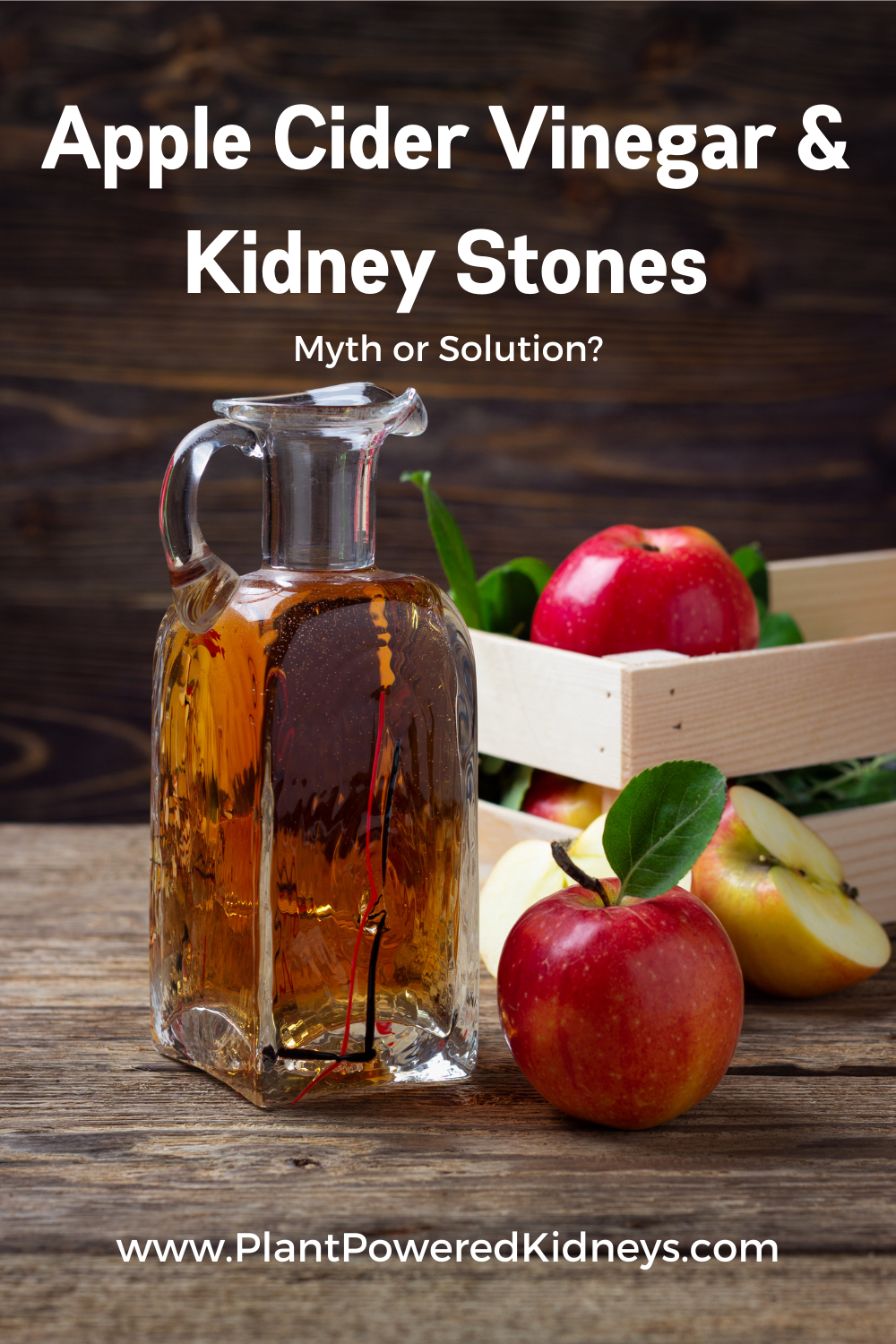
Stones are then deposited into the kidneys. Some will move through the urinary tract and land in the ureter.
Some kidney stones can pass through the body easily.
However, bigger stones will back up urine in the kidney, ureter, bladder and/or urethra.
Pain is a direct result of this blockage.
Types of Kidney Stones
There are four main types of kidney stones:
- Calcium oxalate / calcium phosphate
- Uric acid
- Struvite
- Cystine
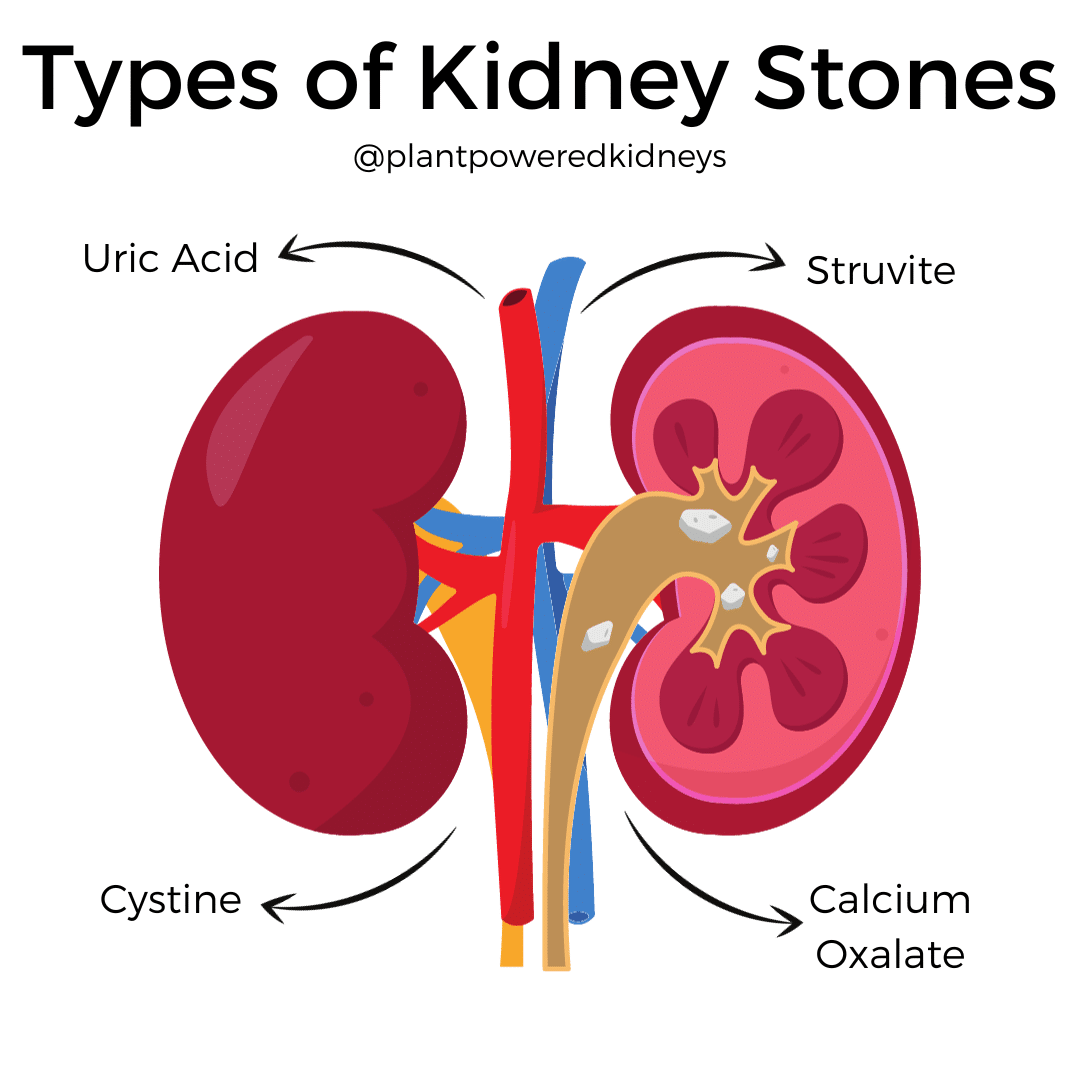
A calcium oxalate stone is the most common kidney stone.
It forms when calcium binds with oxalate in the urine.
Uric acid stones are the second leading cause of this condition.
Struvite stones are seen less often.
Cystine stones are hereditary and also a rare occurrence.
What Causes Kidney Stones?
Kidney stones happen more often than you may realize.
According to The National Kidney Foundation, every year more than a half-million people go to the emergency room for this condition.
Consequently, about one in ten people are likely to have a kidney stone at some time in their life.
Typical reasons for kidney stone formation include;
- Not getting enough water
- Too little or too much exercise
- Obesity
- Weight loss surgery
- A diet high in sugar (especially fructose)
- Getting too much salt
There are also specific causes as to why different stones may form.
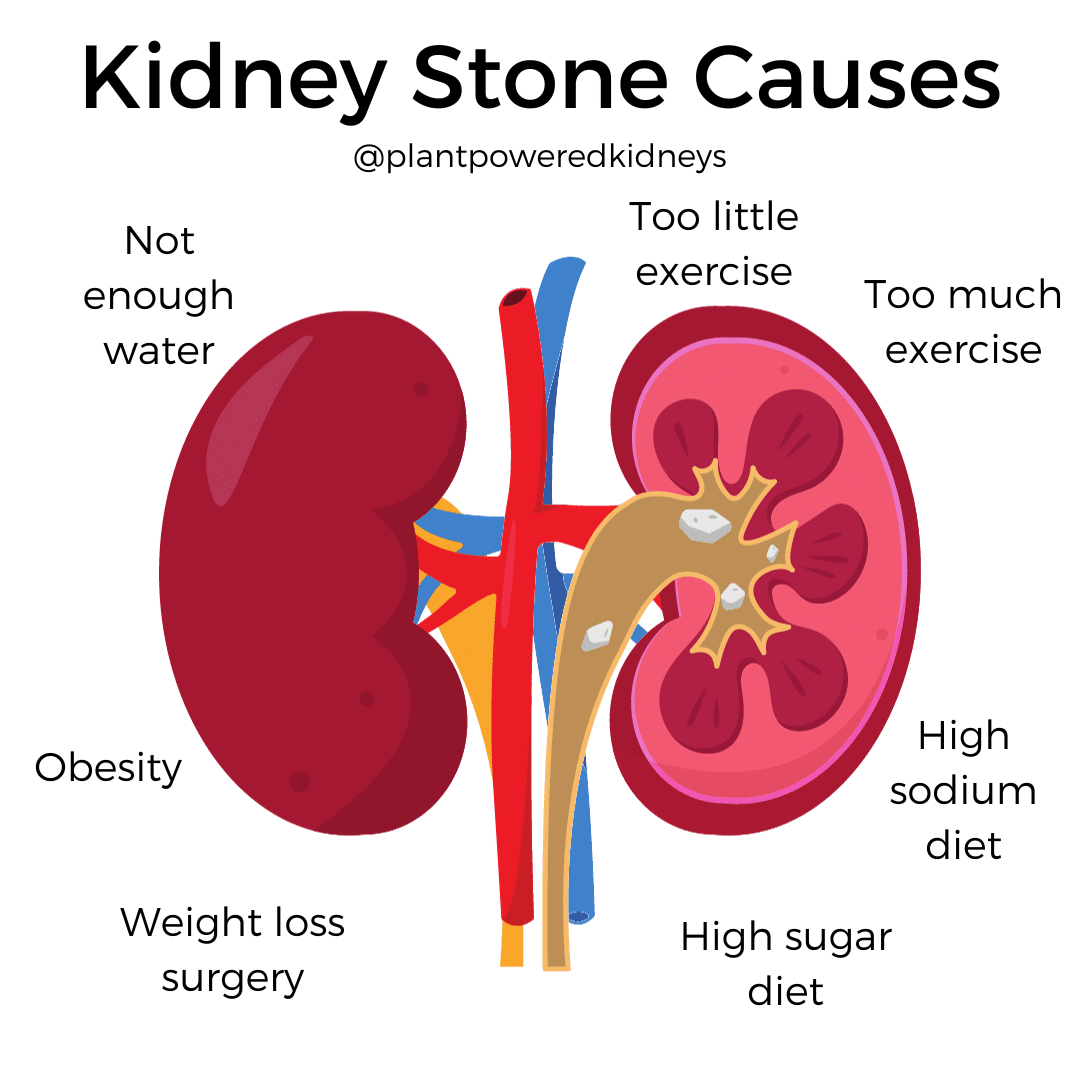
Uric acid stones are a result of a high level of monosodium urate.
This compound is formed when foods with high purines like organ meats and shellfish are consumed.
Struvite stones are a consequence of a buildup of ammonia in the urine.
Ammonia is produced by bacteria from urinary tract infections.
Poor fluid and calcium intake are other reasons that calcium oxalate stones form.
Risk Factors Increase the Chances of Kidney Stones
Incidences of kidney stones have increased about six percent over the last 40 years.
In addition, men are more likely to get this condition with a lifetime risk of 19 percent.
Women, on the other hand, have a lower incidence of kidney stone formation with only a 9 percent risk.
Other things that increase the risk of kidney stones include the following:
- Having a relative with kidney stones
- Surgeries that affect your absorption of water and calcium
- High blood pressure
- Diabetes
- Being obese
- Dehydration
- Diets high in protein, salt, or sugar
- Cystinuria (excess cysteine in the urine)
What are the Symptoms of Kidney Stones?
Symptoms of kidney stones include the following:
- Severe pain on either side of your lower back
- More vague pain or stomach ache that doesn’t go away
- Blood in the urine
- Nausea or vomiting
- Fever and chills
- Urine that smells bad or looks cloudy
Typically, the larger the stone, the more predominant the symptoms.
How Are Kidney Stones Diagnosed?
Kidney stones are diagnosed with a medical history, physical examination, and imaging tests.
A high-resolution CT scan is taken from the kidneys down to the bladder.
A kidney-ureter-bladder x-ray (KUB x-ray) may also be done.
The KUB x-ray will determine what type of treatment should be done.
Some people will need an intravenous pyelogram (IVP) x-ray.
This injects a dye into the urology system to get a better picture of the kidney stone.
In addition, blood and urine tests will evaluate the overall health of the kidneys.
After removal, the stone will be analyzed. Then calcium, phosphorus, and uric acid levels will be retested.
Urine samples may also be collected for up to 24 hours to check for the presence of calcium and uric acid.
Treatment Options for Kidney Stones
The size of the stone, its symptoms, and any other complications will determine whether home remedies or medical interventions should be implemented.
Medical Treatment for Kidney Stones
Some people can pass kidney stones without any problems.
On the other hand, if the stone causes irritation or blockage.
Your doctor may also prescribe medication.
Medicines to prevent uric acid production are often given for uric acid kidney stones.
Shock-wave Lithotripsy
The stone can also be blasted by shock-wave lithotripsy. This non-invasive procedure uses high-energy sound waves to shatter the stone(s) to bits.
Treating kidney stones with this technique makes it easier to pass the stone(s) through the urine.
Uteteroscopy
Ureteroscopy is another procedure done to destroy the kidney stone.
An endoscope is inserted into the ureter where it will obliterate the stone.
Surgery
Surgery is often the last resort and used in only severe cases.
This happens when the stone is too large to pass, it blocks the flow of urine, and/or there is infection.
Two surgical procedures that remove kidney stones are nephrolithotomy and nephrolithotripsy.
Nephrolithotomy removes the kidney stone through a surgical tube.
Nephrolithotripsy combines lithotripsy and sugary.
The stone is first crushed by sound waves and then vacuumed out of the body.
At Home Remedies for Kidney Stones
If your condition is less severe you can treat kidney stones naturally with at-home remedies.
These include:
- Olive oil
- Hydration
- Citrate-rich foods
- Calcium-rich foods
- Avoid foods high in oxalates
- Magnesium-rich foods
- Potassium-rich foods
- Lower salt
- Cut back on sugar
- Reduce animal protein intake
- Apple cider vinegar (ACV)
Some of these are more proven than others.
We will cover all of these home remedies for kidney stones below.
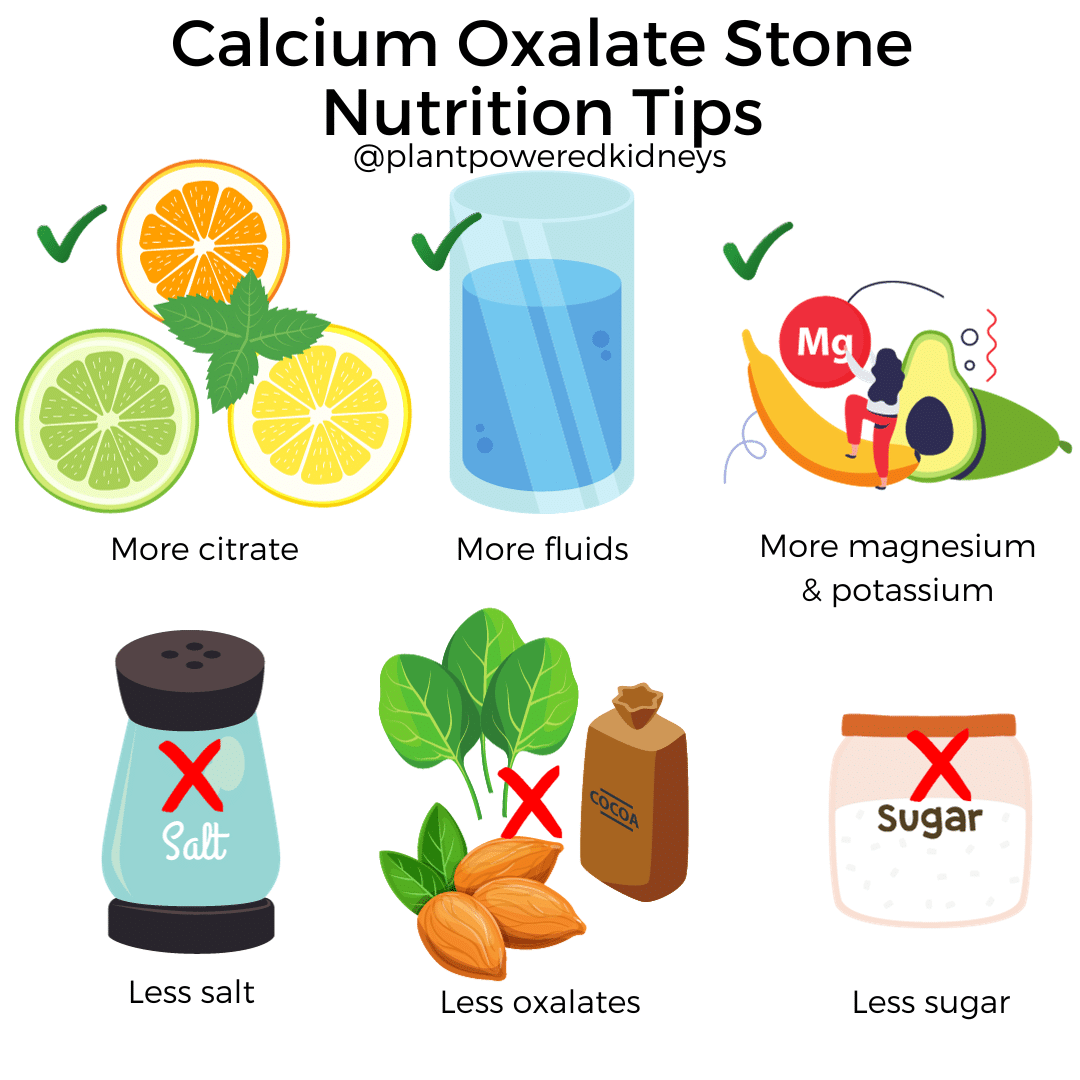
Olive Oil for Kidney Stones
Olive oil for kidney stones is a popular at-home remedy.
The thought behind this remedy is that the olive oil will lubricate the stone to make it easier to pass.
Unfortunately, this has been debunked as a myth.
One animal study looked at supplementing olive oil to a group of mice with calcium oxalate kidney stones.
While they found some benefits for the mice given olive oil, we cannot translate this information to humans.
There are many other factors with humans, such as other foods consumed, hydration, medical history and medications, just to name a few.
There is not enough research at this time to conclude that olive oil would actually prevent or relieve kidney stone problems.
Hydration
Staying hydrated improves kidney stones. This is a true and proven practice in kidney stone management.
Therefore, be sure to drink plenty of plain unsweetened water throughout the day.
Adequate hydration means a urine output of approximately 2 – 2.5 liters of urine per day.
Assuming normal kidney function, drink approximately 2.5 – 3+ liters of fluids per day to produce this amount of urine.
Ask your healthcare provider if a 24-hour urine collection is appropriate to review how much urine you’re producing.
Most of these fluids should be plain water, though other drinks will still count.
Citrate-Rich Foods
Getting enough citrate in the diet is another proven way to reduce calcium-based kidney stones.
Citrate is a substance in lemon and oranges.
It lowers calcium in the urine. It also increases citrate levels in the urine.
Citrate binds with calcium and prevents calcium oxalate stones from forming.
Add citrus to your water for an easy, fun way to stay hydrated and add citrate to your day.
Calcium-Rich Foods
Not getting enough calcium in your diet may lead to calcium oxalate stones.
Therefore, getting at least 1000 to 1,200 milligrams of calcium from foods is a proven method to reduce the formation of calcium-based stones.
More dairy and plant-based calcium foods like fortified bread and cereals, broccoli, seaweed, and beans are recommended for a good source of calcium.
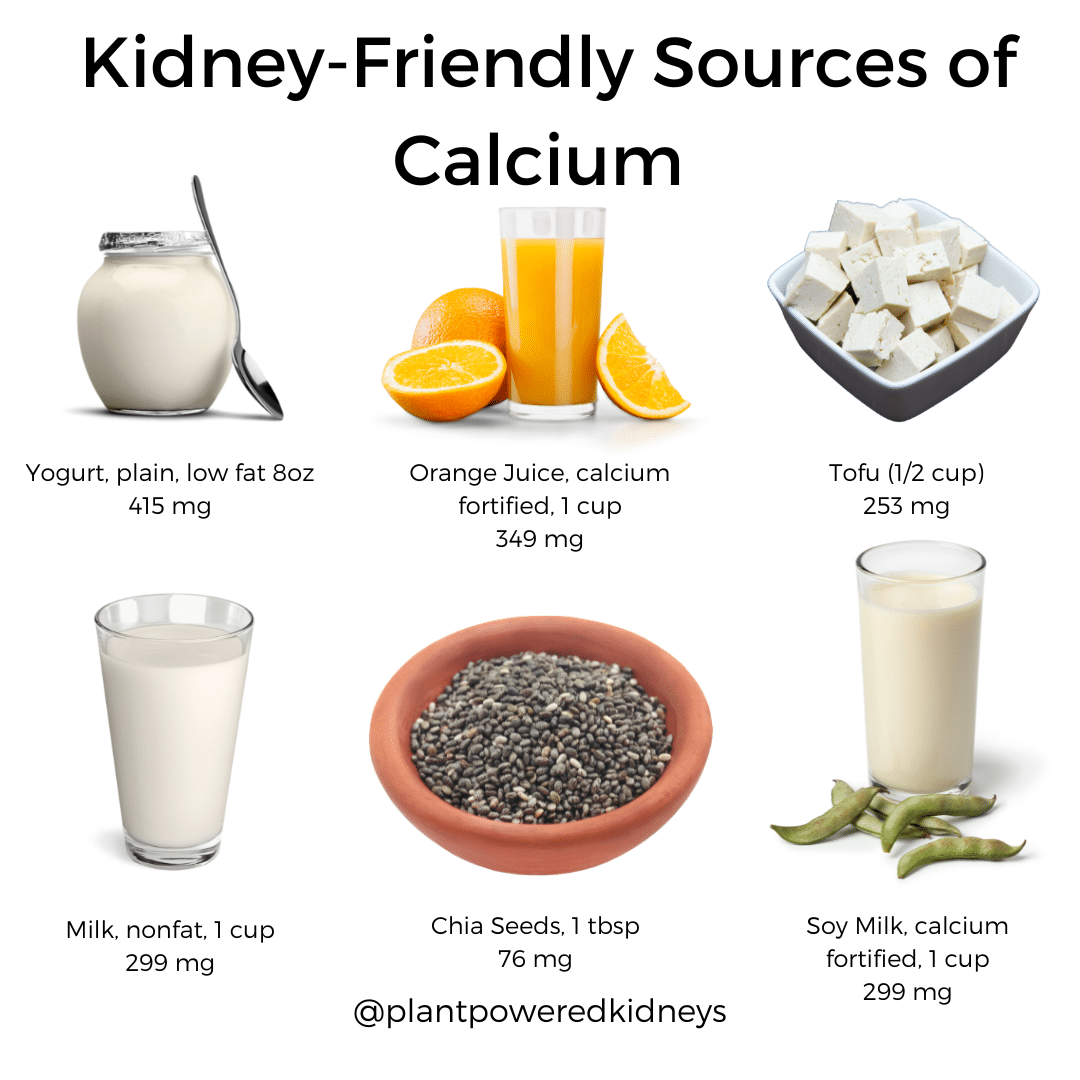
Be careful with calcium supplements as they may actually increase the risk of calcium stones.
Avoid Foods High in Oxalates
A high intake of oxalate foods can also cause oxalate stones.
They include leafy greens, nuts, beans, legumes, and grains.
These foods tend to be healthy so you don’t want to avoid them altogether.
Additionally, limiting high oxalate foods is generally recommended for those with a high oxalate output in their urine.
Interventions recommended before limiting oxalate-rich foods include;
- drinking enough water to produce at least 2.5 liters of urine daily
- following a low sodium diet
- eating 1,000 to 1,200 milligrams calcium in the diet
- eating enough fruits and vegetables
- limiting animal proteins
Another thing to note about high oxalate foods is that pairing them with calcium-rich food will lower the likelihood of stones forming.
This is because the two minerals bind together before getting to the kidneys.
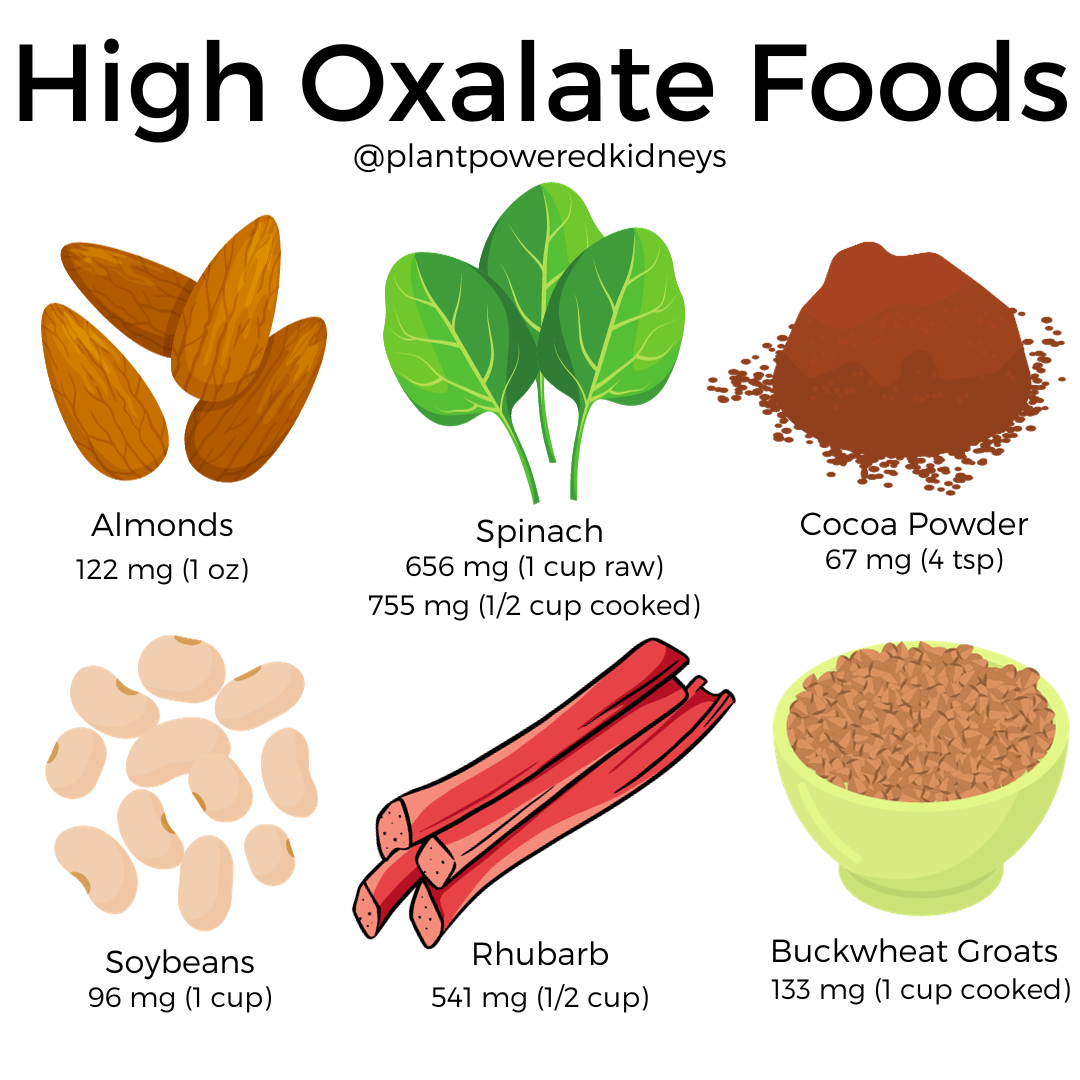
If you’re looking for a full list of oxalate foods you can see this post.
Magnesium and Potassium-Rich Foods
Adding magnesium and potassium-rich foods to your diet can prevent calcium oxalate stones from forming.
This nutrient may also reduce oxalate absorption in the gut.
If you have a restriction in one of these nutrients you can ask your renal dietitian about other ways to improve kidney stones.
Other dietary measures that can help remedy your kidney stones are cutting back on sugar, salt, and animal proteins.
A common diet practice that has been shown to lower risk of kidney stones is the D.A.S.H. Diet.
Learn more about the D.A.S.H. Diet in this post.
Apple Cider Vinegar
“How to pass kidney stones fast at home” is a claim often seen attached to apple cider vinegar.
The next section will discuss its health benefits and if apple cider vinegar for kidney stones really works.
Apple Cider Vinegar Health Benefits
When you google the words “apple cider vinegar” there is a barrage of health benefits that come up.
It is boasted to cure everything from digestion and weight loss to cholesterol and blood pressure.
Weight Loss
There is some truth behind the apple cider vinegar weight loss connection.
In the short term, people taking apple cider vinegar will feel more full and consume less food.
A small study showed the benefits of drinking apple cider vinegar for weight loss.
Consuming 1 or 2 tablespoons of apple cider vinegar for three months resulted in a weight loss of 3 to 4 pounds.
Blood Sugars
Apple cider vinegar also has positive effects on blood sugar and insulin sensitivity.
Most of the research on apple cider vinegar and heart health is limited to animal studies.
They show positive outcomes in blood pressure, triglycerides, and cholesterol.
However, it is hard to know if humans will have the same benefits.
The anti-inflammatory benefits shown in other health conditions are thought to reduce the pain and inflammation that accompanies this condition.
Cholesterol
Apple cider vinegar has shown some promising effects on cholesterol levels.
A meta-analysis published in 2021 found that ACV significantly decreased serum total cholesterol.
Participants with type 2 diabetes were found to have these results after taking at least 15 milliliters of ACV daily for at least 8 weeks.
Participants without health conditions were found to have benefits with fasting plasma glucose and HDL cholesterol levels.
Apple Cider Vinegar for Kidney Stones
Apple cider vinegar is considered an alkaline food.
As a result, it should lower acid levels in the urine and blood.
It is also credited with increasing stomach acid. All of which should prevent someone from developing kidney stones.
How does apple cider vinegar dissolve kidney stones?
The thought behind apple cider vinegar for kidney stones is acetic acid.
It is speculated that this compound will soften and break up kidney stones.
Once in small pieces, they can pass easily through the urinary tract.
But does apple cider vinegar really work to stop kidney stones?
The Research about ACV and Kidney Stones
Most of the information on apple cider vinegar is unreliable. To say this food helps dissolve kidney stones is a bit of a stretch.
The acetic acid in apple cider vinegar does have anti-inflammatory properties which may be helpful for improving kidney stones.
There were only two studies showing an actual correlation between kidney stone prevention and apple cider vinegar.
One study found fermented vinegar was associated with lower incidences of kidney stones.
However, the study did not specify ACV in this research. Additionally, other items including tea and legumes found similar benefits.
The other was a test-tube study involving human kidney cells.
It showed that acetic acid can prevent calcium oxalate stones from forming.
Acetic acid was also responsible for producing higher levels of citrate which we know also can hinder calcium oxalate stones from forming.
However, a study looking at cells cannot tell us if a diet with ACV would produce the same results.
If you don’t have calcium oxalate stones, apple cider vinegar is not of any help to you.
There is no research on how apple cider vinegar affects other kidney stones.
Therefore, we have no proven research if it can help other types of kidney stones.
How To Take Apple Cider Vinegar
While it’s not proven that ACV will prevent or reduce kidney stones, some people may prefer to enjoy it for other benefits.
Apple cider vinegar is added to beverages and food.
However, it also comes in supplement form (more about that later).
The time of day does not seem to matter. You can start your day with apple cider vinegar in the morning before breakfast.
Or you can cleanse the palate by having apple cider vinegar after meals.
Never Drink ACV Straight
One thing you don’t want to do is drink apple cider vinegar without any dilution.
The apple cider vinegar acidity will wash away your tooth enamel.
Therefore, always dilute it before drinking.
Mix with Water
To add ACV to your diet habits, start by mixing 1 teaspoon into at least 8 ounces of water.
If possible, use a straw while drinking your ACV water mixture.
This helps to bypass some of your teeth and reduce the chance of the acidity harming your teeth enamel.
This ratio may be increased gradually up to 2 tablespoons per day.
However, that quantity may not be necessary as less has been shown to help.
Additionally, you may experience gastrointestinal distress if you drink/consume too much apple cider vinegar.
Get an Apple Cider Vinegar With “the Mother”
When choosing apple cider vinegar you want to make sure you get a quality product.
It may be organic, unfiltered, and contain “the mother.”
Some apple cider vinegar will have a cloudy and murky look.
This is what’s known as “the mother.” It contains beneficial bacteria, yeast, and protein.
“The mother” is also where you get the acetic acid.
It is also assumed that the mother is what gives apple cider vinegar its other health benefits.
However, the jury is still out on this research.
One popular quality brand is Braggs.* You may also find high-quality apple cider vinegar products on Amazon.
Note that unpasteurized foods including ACV are not recommended for kidney transplant patients.
Apple Cider Vinegar Supplements
Apple cider vinegar has become quite a popular supplement.
It is available in tablet, capsule, and gummy form.
No research has been done on these supplements so their true effects are unknown.
In addition, they have been found to have inaccurate dosages.
Apple cider vinegar supplements may also contain additives that could cause medical interactions if you have any current health conditions.
So when in doubt it’s best to ask your healthcare team about any potential dangers before taking ACV supplements.
Other Apple Cider Vinegar Uses
If you’re feeling skirmish about drinking apple cider vinegar there are additional ways to get its benefits.
You can take the same dose and add it to your salad dressings, sauces, mayonnaise, vinaigrette, and smoothies.
It also makes a great marinade for your proteins and veggies.
If you are not sure how to incorporate apple cider vinegar into your diet ask your renal RD for some meal ideas.
Apple Cider Vinegar Side Effects
In regards to specific apple cider vinegar side effects on kidneys, the National Kidney Foundation has said that apple cider should not cause any damage to the kidneys.
However, there have been some other negative side effects associated with the use of apple cider vinegar.
Long-term use of apple cider vinegar could shift the body’s acid-base balance.
Another potential issue with large doses of apple cider vinegar is nausea.
Drinking eight ounces of apple cider vinegar for six years resulted in hospitalization for low potassium and weakened bones.
Apple cider vinegar also caused skin and throat irritation.
Apple cider vinegar allergies are also something to consider.
They are not common but some people can have an intolerance to the salicylates, histamine, sulfites, and acetic acid found in vinegar.
Signs of vinegar intolerance are similar to other allergy symptoms. They include;
- Diarrhea
- Hives
- Stuffy nose
- Feeling swollen
- Stomach pain
- Bloating
- Constipation
- Dizziness
- Fast heart rate
- Congestion
- Headache
- Itchy skin
- Sneezing
- Nausea
- Shortness of breath
- Tightening of the airway muscles
- Wheezing
- Tingling sensation
Apple Cider Vinegar Medical and Drug Interactions
Apple cider vinegar can also cause medical and drug interactions.
It can lower potassium levels in people on insulin, digoxin, and diuretic drugs like chlorothiazide, chlorthalidone, furosemide, and hydrochlorothiazide.
People with type 1 diabetes who have gastroparesis should also not take apple cider vinegar.
If you have a health condition and/or are on any medications ask your healthcare team if apple cider vinegar is okay to take.
Better Ways to Prevent Kidney Stones
If you’re looking for thorough evidence-backed ways to prevent kidney stones here is a list of some easy things you can do right now.
- Drink more water – add citrus for hydration and extra citrate
- Limit sugar and high-fructose corn syrup
- Cut out excess sodium and salted foods
- Eat more fruits and vegetables
- Get enough calcium
- Avoid too many high oxalate foods
- Switch animal proteins for plant-proteins
- Maintain a healthy weight
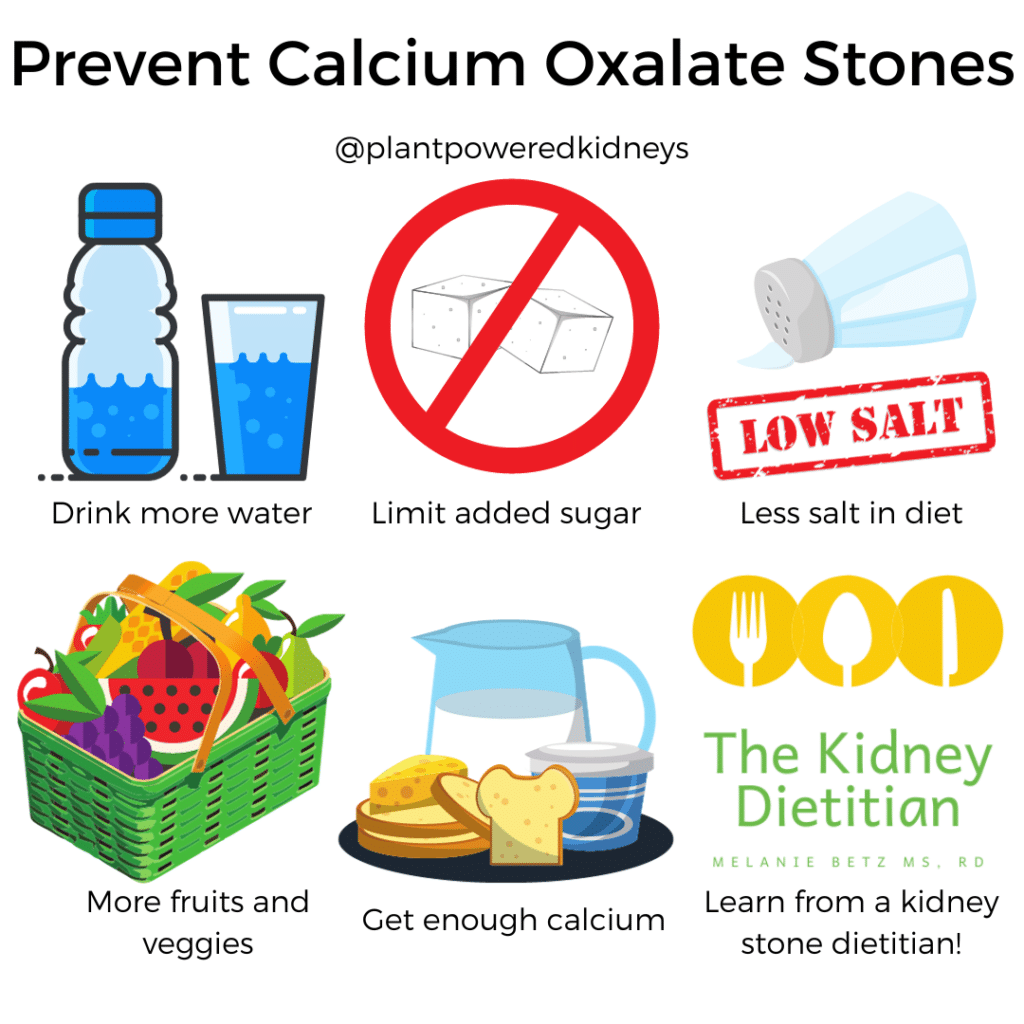
When to See A Kidney Doctor and Renal Dietitian
If you have uncontrollable pain and recurring kidney stones it could be an indication of a bigger problem like kidney disease.
If you’re wondering when to enlist the help of a kidney doctor and renal dietitian.
It should be when you first notice a kidney stone symptom.
They can provide medical advice based on your diagnosis and medical history.
Check out this page to learn about our renal dietitians. For other dietitians, check out this page.
Register for Kidney Stone Nutrition School
Taught by renal dietitian, Melanie Betz, you’ll get straightforward guidance and information in this course all about calcium oxalate kidney stones.
If this is the type of stone that is causing you pain, while also taking up way too much of your time in trying to figure out how to stop them, this is the answer!
Click here to learn more and register for the Kidney Stone Nutrition School.*
Summary
Kidney stones are formed when calcium, oxalate, urate, cystine, xanthine, and/or phosphate levels build up in the kidneys. If the stone gets backed up urine in the kidney, ureter, bladder, and/or urethra becomes blocked and pain will ensue.
When medically reviewed apple cider vinegar for kidney stones may be a promising home remedy thanks to the active ingredient acetic acid and its effect on citrate in the body. These compounds can dissolve calcium oxalate stones and prevent them from recurring.
However, apple cider vinegar has no effects on other types of kidney stones. Furthermore, there is also the potential of side effects, intolerance, and/or allergy. Apple cider vinegar is also contraindicated with people on certain medications so it is best to ask your healthcare team before taking apple cider vinegar for kidney stones in any form.
If you have kidney stone pain you should seek the help of a renal dietitian and kidney doctor. They can diagnose and treat the stones properly.
In the meantime, you can also take some additional steps towards preventing kidney stones from forming. These include increasing water, fruit, and vegetable intake. Cutting back on sugar, salt, and animal proteins has also been shown to reduce incidences of kidney stones.
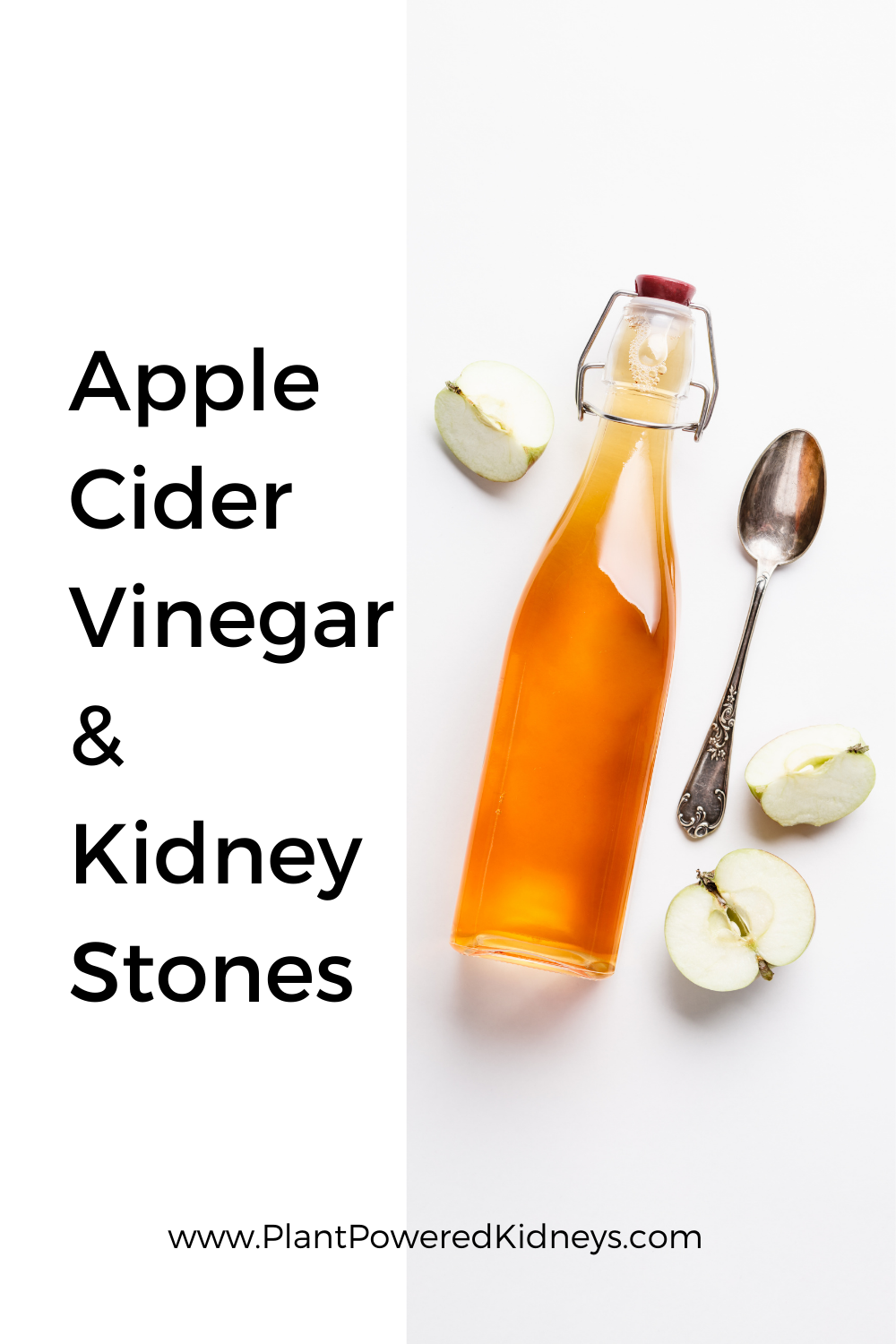



I understand that it is recommended to take 1-2 tablespoons of ACV per serving to help reduce high levels of oxalate. How many times a day is this amount recommend to be effective?
Hi David! My good friend and colleague Melanie is a renal dietitian and kidney stone expert and has debunked this myth. She teaches a great Kidney Stone Nutrition Course about how to prevent kidney stones – here’s our affiliate link! Highly recommend this course to help eliminate all the confusion around kidney stones.. I know there’s a lot of weird stuff out there.